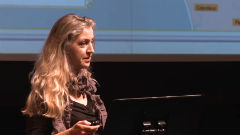Rebecca Solnit
Writer, historian, and activist Rebecca Solnit has written 14 books about environment, landscape, community, art, politics, hope, and memory, the most recent of which is The Faraway Nearby (2013), a book on empathy and storytelling. In Wanderlust: A History of Walking (2000), Solnit draws from the work of philosophers, poets, and scientists who endorsed the act of walking as a necessary component of our everyday lives and provides intriguing arguments for why walking is still important, even in the age of more efficient modes of transportation. Solnit revisits “wandering” again in A Field Guide to Getting Lost (2005). Her 2009 book, A Paradise Built in Hell: The Extraordinary Communities that Arise in Disaster, began as an essay entitled “The Uses of Disaster: Notes on Bad Weather and Good Government,” published by Harper’s the day that Hurricane Katrina hit the Gulf Coast. In a conversation with filmmaker Astra Taylor for BOMB magazine, Solnit summarized the radical theme of the book: “What happens in disasters demonstrates everything an anarchist ever wanted to believe about the triumph of civil society and the failure of institutional authority.” Other titles by Solnit include Infinite City: A San Francisco Atlas (and the forthcoming New Orleans sequel); Hope in the Dark: Untold Histories, Wild Possibilities; and River of Shadows, Eadweard Muybridge and the Technological Wild West (for which she received the National Book Critics Circle Award in criticism, and the Lannan Literary Award). A product of the California public education system from kindergarten to graduate school, Solnit works with the group 350. org on climate issues. She is a contributing editor to Harper’s and a regular contributor to the political site TomDispatch.com.
Why we love Rebecca:
• Rebecca has written on the logic-defying informal communities that arise during times of intense danger and emergency
• She revealed whimsical, sometimes conflicted narratives contained within San Francisco, revealed by maps showing toxic mines and factories alongside farmers’ markets, farms, and artisan food producers
• As a member of the group 350.org, she is a leading voice on climate issues

